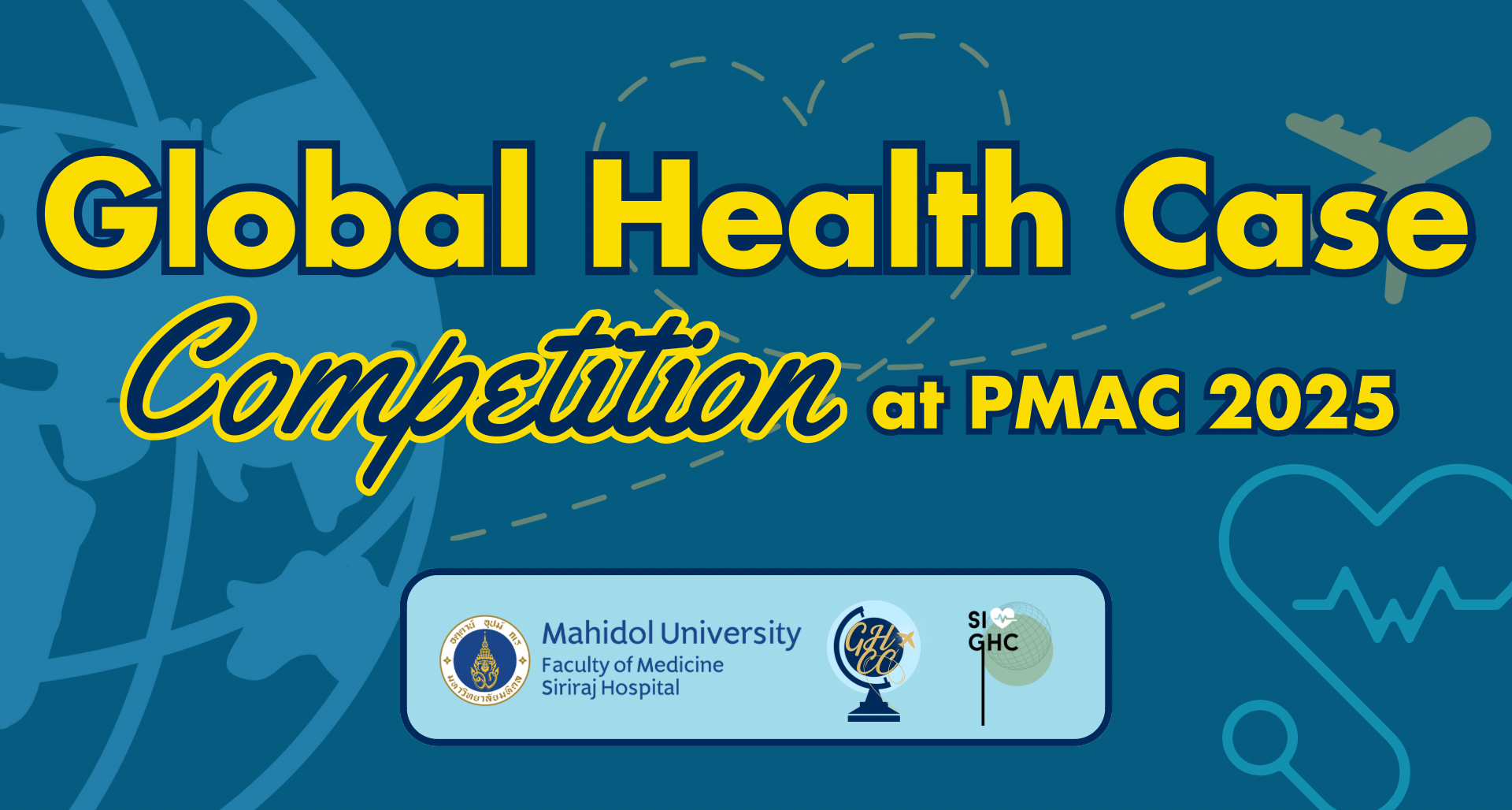Side Meetings
SMB131
Global Health Case Competition: Pioneering Reverse Innovation in Real-World Challenges
28
Jan
- Faculty Of Medicine Siriraj Hospital, Mahidol University
- Siriraj Medical Student Union

Global health addresses health issues that span national boundaries, aiming to improve health outcomes and reduce disparities worldwide. It encompasses efforts to combat infectious diseases, manage chronic illnesses, and ensure equitable access to healthcare while considering the impact of social, economic, and environmental factors. The field highlights the interconnectedness of global health systems and the necessity for collaborative, multidisciplinary approaches. By integrating expertise from medicine, public health, policy, and other disciplines, global health initiatives tackle complex challenges and work towards sustainable solutions. This Global Health Case Competition seeks to leverage these multidisciplinary strategies by bringing together international medical students to collaboratively develop innovative solutions for pressing global health issues.
This time, we aim to introduce the concept of Reverse Innovation, a concept introduced by Jeff Immelt, the former Chairman and CEO of General Electrics, as well as Vijay Govindarajan and Chris Trimble, both authors of Ten Rules for Strategic Innovators – From Idea to Execution. Reverse innovation allows for the adaptation and adoption of ideas, technologies, and solutions originally developed in low-resource settings to more advanced or high-income countries. This approach often leads to innovations that are cost-effective, scalable, and adaptable, addressing both global and local challenges. Reverse innovation helps bridge gaps in healthcare by applying practical, resource-efficient solutions to problems faced in wealthier regions, driving improvements in quality, accessibility, and affordability of healthcare. Additionally, it promotes a more inclusive approach to innovation by recognizing and valuing the creativity and resourcefulness of low-resource settings, ultimately fostering more equitable global health advancements.
A global health case competition themed reverse innovation would involve teams developing solutions designed for low-resource settings. They present their ideas, focusing on feasibility, impact, and cost-effectiveness, and are judged on their ability to adapt and integrate these innovations into existing healthcare systems. This competition emphasizes the value of resourceful solutions from low-income settings and promotes creative approaches to improving global health.
- Ensure that Participants and the Public Are Aware and Understand the Importance of Current Global Health Issues Related to Reverse Innovation:
- Increase awareness of how innovations developed in low-resource settings can address significant health challenges globally. By highlighting successful reverse innovations—such as cost-effective medical technologies or novel healthcare delivery models from resource-limited areas—the initiative educates participants and the public on their relevance and potential impact.
- Promotes appreciation for the value of cross-contextual learning and encourages a more informed dialogue about global health solutions.
- To Engage medical students with shared interests in global health to form teams, positioning organizers as leaders in the field of global health.
- Strengthen and build partnerships and networks with professionals, academics, and organizations, fostering future collaborations.
- To serve as a starting point for youth involvement in solving global health problems.
- Engage young people in exploring and developing reverse innovations. By providing opportunities for youth to investigate how solutions from low-resource settings can be adapted to high-income contexts, the initiative fosters early involvement in global health problem-solving. This could involve educational programs, project-based learning, and mentorship that focus on reverse innovation.
- Encourage creative thinking on how to transfer and scale solutions across different settings, preparing youth to contribute to impactful global health advancements.
- To promote youth engagement and to create opportunities for our medical students to participate in international conferences
- Actively involving youth and medical students in high-profile global health forums. By facilitating their participation in renowned international conferences, the initiative provides valuable exposure and networking opportunities. This involvement allows students to engage with leading experts, contribute to significant discussions, and gain insights into cutting-edge research and practices. Such experiences not only enhance their professional development but also help integrate them into the global health community, fostering their growth as future leaders in the field.

